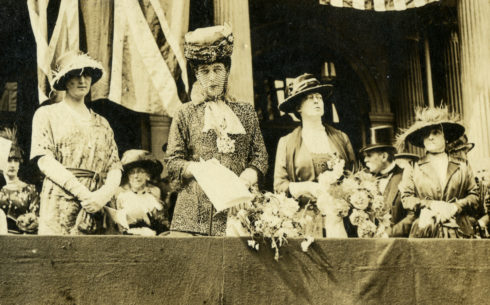About Us > Our History
Care for Veterans is a remarkable institution with an inspiring history. When casualties in the First World War reached appalling numbers, the home was founded to care for those who were permanently disabled. The vision of Gladys Marchioness of Ripon, The Queen Alexandra Hospital Home was founded in 1919 in Roehampton through the generosity of the Charrington family.
Our History
Care for Veterans (formerly The Queen Alexandra Hospital Home) was founded in 1919 to care for those returning from World War 1 with life-changing disabilities, and our foundation was thanks to the compassion, campaigning and dedication of three amazing women. In 1916, Lady Ripon, lady in waiting to Queen Alexandra, first recognised the need to establish a home to provide care and rehabilitation for the war-wounded after the war had ended. However, when Lady Ripon died in 1917, her daughter, Lady Juliet Duff, and friend, Verena Hay, became the driving force in creating our charity, initially established at Roehampton, London, but moving to Worthing in 1933. An early resident said, ‘‘It’s a grand thing to be welcomed to a lovely place like this. Everyone here is magnificent…they make no fuss about rules and regulations – behave yourself and do practically as you please is the regime. I have been taking medicine 3-4 times a day for 7 years but today the doctor told me I could knock it off!”
Our Care
Although much has changed over 100 years, what has endured is our trademark of providing the very best nursing care and rehabilitation, centred around each individual, to give our veterans the very best quality of life in spite of their disability.
Over the years, we have expanded and adapted, and the way we have journeyed has been shaped by our veterans’ needs. The establishment of physiotherapy, occupational therapy, speech therapy, neuropsychology, the wheelchair clinic and social and recreational therapy has all been in response to need, and we continue to adapt what we offer on the requirements of those in our care, with input from them every step of the way. Nowadays we focus on caring for those with acquired brain injury and degenerative neurological conditions, due to the great need for care and rehabilitation in these areas. It remains our purpose to rehabilitate each individual to maximise potential, and to enable them to return home to independent living if that is possible. However for those who, due to their injury or condition, will not be able to leave us, we remain committed to ensuring their quality of life is the very best that we can give them.
We also support the families of our veterans and ensure that they have input into how their loved one is cared for.
Your Support
We now care for people with more complex and demanding disabilities than ever before. The care and rehabilitation teams have risen to the challenges this has created, and our fundraising team strives hard to ensure that financially, we can continue to provide our veterans with what they so richly deserve. We are aware that our supporters and donors are vital to us and thank you all, for all that you have contributed over many years – we simply could not do what we do without you.
Miss J M Holgate, MVO who dedicated 46 years of her life to our charity said, and it is still relevant to this day: “From the moment I arrived here, I was aware I was entering a very special place and that I was amongst very special people. The need today may seem to be far removed from that which inspired Lady Ripon’s vision, but this charity has a tradition of adapting to meet the needs of the day. May it long continue to do so.”
Find out more about our care and rehabilitation services
‘I have been impressed and awed by the achievements of Care for Veterans and spoke of their contribution in Parliament. My many visits to the charity are rewarded by the sense of peace, purpose and most of all the dignity that the residents have.’ Sir Peter Bottomley, MP

Lady Juliet Duff (left), Queen Alexandra (centre left) and Verena Hay (far right) at the opening ceremony of The Queen Alexandra Hospital Home in 1919
Responsive site designed and developed by
Click to go Madison Web Solutions' website